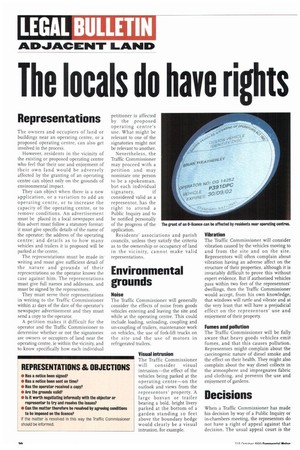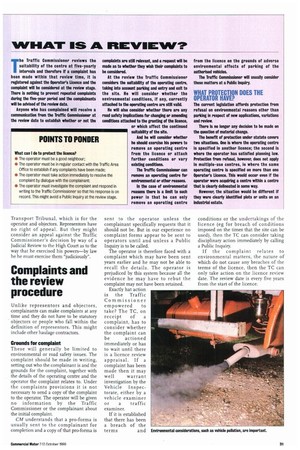The locals do have rights
Page 32

Page 33

If you've noticed an error in this article please click here to report it so we can fix it.
Representations
The owners and occupiers of land or buildings near an operating centre, or a proposed operating centre, can also get involved in the process.
However, residents in the vicinity of the existing or proposed operating centre who feel that their use and enjoyment of their own land would be adversely affected by the granting of an operating centre can object only on the grounds of environmental impact.
They can object when there is a new application, or a variation to add an operating centre, or to increase the capacity of the operating centre, or to remove conditions. An advertisement must be placed in a local newspaper and this advert must follow a statutory format: it must give specific details of the name of the operator; the address of the operating centre; and details as to how many vehicles and trailers it is proposed will be parked at the centre.
The representations must be made in • writing and must give sufficient detail of the nature and grounds of their representations so the operator knows the case against him. The representations must give full names and addresses, and must be signed by the representors.
They must serve their representations in writing to the Traffic Commissioner
within 21 days of the date of the operator's newspaper advertisement and they must send a copy to the operator.
A petition makes it difficult for the operator and the Traffic Commissioner to determine whether or not the signatories are owners or occupiers of land near the operating centre, ie within the vicinity, and to know specifically how each individual petitioner is affected by the proposed operating centre's use. What might be relevant to one of the signatories might not be relevant to another.
Nevertheless, the Traffic Commissioner may proceed with a petition and may nominate one person to be a spokesman, but each individual signatory, if considered valid as a representor, has the right to attend a Public Inquiry and to be notified personally of the progress of the application.
Residents' associations and parish councils, unless they satisfy the criteria as to the ownership or occupancy of land in the vicinity, cannot make valid representations.
Environmental grounds
Noise
The Traffic Commissioner will generally consider the effects of noise from goods vehicles entering and leaving the site and while at the operating centre. This could include loading, unloading, coupling and un-coupling of trailers, maintenance work on vehicles, the use of fork-lift trucks on the site and the use of motors in refrigerated trailers.
Visual intrusion
The Traffic Commissioner will consider visual intrusion—the effect of the vehicles being parked at the operating centre—on the outlook and views from the representors' property. A large boxvan or trailer bearing a bold, bright livery parked at the bottom of a garden standing ro feet above the boundary hedge would clearly be a visual intrusion, for example.
Vibration
The Traffic Commissioner will consider vibration caused by the vehicles moving to and from the site and on the site. Representors will often complain about vibration having an adverse affect on the structure of their properties, although it is invariably difficult to prove this without expert evidence. But if authorised vehicles pass within two feet of the representors' dwellings, then the Traffic Commissioner would accept, from his own knowledge, that windows will rattle and vibrate and at the very least that will have a prejudicial effect on the representors' use and enjoyment of their property.
Fumes and pollution
The Traffic Commissioner will be fully aware that heavy goods vehicles emit fumes, and that this causes pollution. Representors might complain about the carcinogenic nature of diesel smoke and the effect on their health. They might also complain about the way diesel collects in the atmosphere and impregnates fabric and clothing, and prevents the use and enjoyment of gardens.
Decisions
When a Traffic Commissioner has made his decision by way of a Public Inquiry or in-chambers meeting, the representors do not have a right of appeal against that decision. The usual appeal court is the
Transport Tribunal, which is for the operator and objectors. Representors have no right of appeal. But they might consider an appeal against the Traffic Commissioner's decision by way of a Judicial Review to the High Court as to the way that he exercised his powers—by law he he must exercise them "judiciously".
Complaints and the review procedure
Unlike representors and objectors, complainants can make complaints at any time and they do not have to be statutory objectors or people who fall within the definition of representors. This might include other haulage contractors.
Grounds for complaint These will generally be limited to environmental or road safety issues. The complaint should be made in writing, setting out who the complainant is and the grounds for the complaint, together with the details of the operating centre and the operator the complaint relates to. Under the complaints provisions it is not necessary to send a copy of the complaint to the operator. The operator will be given no information by the Traffic Commissioner or the complainant about the initial complaint.
CM understands that a pro-forma is usually sent to the complainant for completion and a copy of that pro-forma is
sent to the operator unless the complainant specifically requests that it should not be. But in our experience no complaint forms appear to be sent to operators until and unless a Public Inquiry is to be called.
The operator is therefore faced with a complaint which may have been sent years earlier and he may not be able to recall the details. The operator is prejudiced by this system because all the evidence he may have to rebut the complaint may not have been retained.
Exactly hat action is the Traffic Commissioner empowered to take? The TC, on receipt of a complaint, has to consider whether the complaint can
be actioned immediately or has to wait until there is a licence review appraisal. If a complaint has been made then it may well warrant investigation by the Vehicle Inspectorate, either by a vehicle examiner
or a traffic examiner, If it is established that there has been a breach of the terms and conditions or the undertakings of the licence (eg for breach of conditions imposed on the times that the site can be used), then the TC can consider taking disciplinary action immediately by calling a Public Inquiry.
If the complaint relates to environmental matters, the nature of which do not cause any breaches of the terms of the licence, then the TC can only take action on the licence review date. The review date is every five years from the start of the licence.
REPRESENTATIONS &OBJECTIONS
• Has a notice been signed?
• Has a notice been sent on time?
• Has the operator received a copy?
• Are the grounds valid?
• Is it worth negotiating informally with the objector or representor to try and resolve the Issues?
• Can the matter therefore be resolved by agreeing conditions to be imposed on the licence?
If the matter is resolved in this way the Traffic Commissioner should be informed.
WHAM Is AL IFIEVIEW7
The Traffic Commissioner reviews the suitability of the centre at five-yearly intervals and therefore if a complaint has been made within that review time, it is registered against the Operator's Licence and the complaint will be considered at the review stage. There is nothing to prevent repeated complaints during the five-year period and the complainants will be advised of the review date.
complaints are still relevant, and a request will be made as to whether they wish their complaints to be considered.
At the review the Traffic Commissioner considers the suitability of the operating centre, taking into account parking and entry and exit to the site. He will consider whether the environmental conditions, if any, currently attached to the operating centre are still valid.
He will also consider whether there are any road safety Implications for changing or amending conditions attached to the granting of the licence, or which affect the continued suitabilfty of the site.
And he will consider whether he should exercise his powers to remove an operating centre from the licence or attach further conditions or vary existing conditions.
The Traffic Commissioner can remove an operating centre for environmental or other reasons.
In the case of environmental reasons there is a limit to such power in that he can only remove an operating centre
from the licence on the grounds of adverse environmental effects of parking of the authorised vehicles.
The Traffic Commissioner will usually consider these matters at a Public Inquiry.
WHAT PROTECTION DOES THE OPERATOR HAVE?
The current legislation affords protection from refusal on environmental reasons other than parking in respect of new applications, variations and review.
There is no longer any decision to be made on the question of material change.
The benefit of protection under statute covers two situations. One is where the operating centre is specified in another licence; the second is where the operator has satisfied planning law. Protection from refusal, however, does not apply in multiple-use centres, ie where the same operating centre is specified on more than one Operator's Licence. This would occur even if the operator were acquiring a centre within a centre that is clearly delineated in some way.
However, the situation would be different if they were clearly identified plots or units on an industrial estate.
POINTS TO PONDER
What can I do to protect the licence?
• The operator must be a good neighbour; • The operator must be in regular contact with the Traffic Area Office to establish if any complaints have been made; • The operator must take action immediately to resolve the complaint by dialogue with the complainant; • The operator must investigate the complaint and respond in writing to the Traffic Commissioner so that his response is on record. This might avoid a Public Inquiry at the review stage. Anyone who has complained will receive a communication from the Traffic Commissioner at the review date to establish whether or not the




















































































































